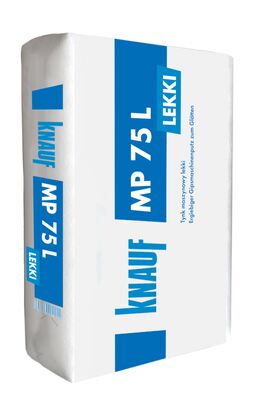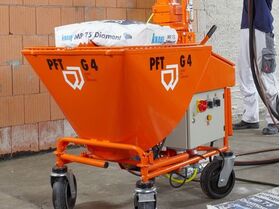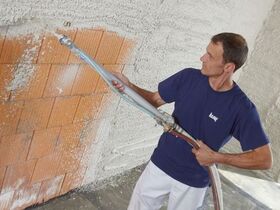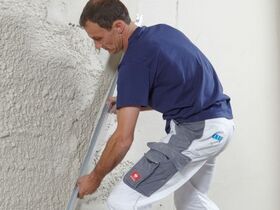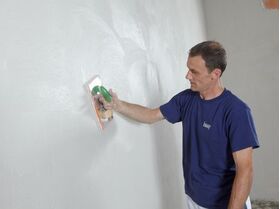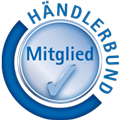Sprayable gypsum plaster with light ballast KNAUF MP 75 LIGHT
Knauf MP 75 Light is used for all internal plasterable substrates in walls and ceilings whether in homes, offices, schools, hotels or hospitals. In wet rooms, the surface layer/sealing layer must be carried out according to industry regulations. The plaster is applied in one layer from 8 to 50 mm and in one operation.In addition to mechanical plastering, MP 75 Leicht can be used as a hand plaster if desired.
MP 75 Light is thick and very flexible and meets the normal requirements. If higher surface strength is required, choose our product MP 75.
Smooth machine plaster for interior plastering of walls and ceilings in homes, offices, hotels, schools or hospitals. Also works as a hand plaster.
Specific characteristics
- Perfect surface
- All in one layer
- Surface texture can be varied
- Dry
- Minimal finishing touches
- Dries evenly and tension-free
- Climate regulation
- Nails and screws
- Withstands heat, provides heat
- Open to diffusion
- Super strong
- Chemically neutral
Application areas
Modern construction makes special demands on the use of plasters. For lightweight concrete, sand-lime brick, concrete, mixed masonry, plasterboard or porous building materials, MP 75L is the ideal plaster because its specific properties harmonize with the properties of these substrates. For internal plastering of walls and ceilings. For rooms with normal humidity including residential kitchens and bathrooms. MP 75L is very suitable for use in wet rooms and in accordance with current industry regulations. MP 75L is applied by PFT machine when plastering large areas. On smaller jobs it can also be used as a hand plaster.
| Material |
MP-75
(gypsum plaster)
|
MP-75L
(gypsum plaster)
|
MP-75 Diamant (gypsum plaster)
|
| Flexural strength in tension |
>1,0N/mm2
|
>1,0N/mm2
|
>2,5N/mm2
|
| Compressive strength |
>2,5N/mm2
|
>2,0N/mm2
|
>6N/mm2
|
| Water vapor diffusion resistance factor |
8
|
5
|
8
|
| Thermal conductivity |
0,35W/mk
|
0,26W/mk
|
0,47W/mk
|
| Material consumption for 1 m2 when the thickness of the layer of mortar is 1 cm |
10,5 kg
|
8 kg.
|
12 kg.
|
In winter, the amount of water vapor in the air is greater indoors than outdoors. Because of this pressure difference, the warmer water vapor tries to move from inside to outside. This is called diffusion of water vapor, or in colloquial terms, "the plaster breathes". Depending on the plaster mix used, the diffusing water vapor encounters a certain resistance (µ). The higher the water vapor diffusion resistance factor, the slower the water vapor diffuses through the material. Thermal conductivity is the ability of the material to conduct heat, i.e. the ability of the material to insulate. This property is described by the coefficient of thermal conductivity λ (expressed in W/mK). The lower the value of λ, the better the insulation capacity of the material. It must be mentioned that MP-75l gypsum mortar has an excellent thermal insulation capacity (0.26 W/mK). Thus, the lower the coefficient λ, the less heat loss.
Plastering with KNAUF MP 75 LIGHT
No posts found


